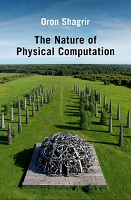The Nature of Physical Computation
Abstract
Computing systems are everywhere today. Even the brain is thought to be a sort of computing system. But what does it mean to say that a given organ or system computes? What is it about laptops, smartphones, and nervous systems that they are deemed to compute, and why does it seldom occur to us to describe stomachs, hurricanes, rocks, or chairs that way? The book provides an extended argument for the semantic view of computation, which states that semantic properties are involved in the nature of computing systems. Laptops, smartphones, and nervous systems compute because they are accompanied by representations. Stomachs, hurricanes, and rocks, for instance, which do not have semantic properties, do not compute. The first part of the book argues that the linkage between the mathematical theory of computability and the notion of physical computation is weak. Theoretical notions such as algorithms, effective procedure, program, and automaton play only a minor role in identifying physical computation. The second part of the book reviews three influential accounts of physical computation and argues that while none of these accounts is satisfactory, each of them highlights certain key features of physical computation. The final part of the book develops and argues for a semantic account of physical computation and offers a characterization of computational explanations.
Keywords
Metaphysics; Philosophy of Mathematics & Logic; Philosophy of Computational Science; Philosophy of Mathematics & LogicDOI
10.1093/oso/9780197552384.001.0001ISBN
9780197552384, 9780197552407, 9780197552391Publisher
Oxford University PressPublisher website
https://global.oup.com/Publication date and place
2022Grantor
Classification
Computer science


 Download
Download Web Shop
Web Shop